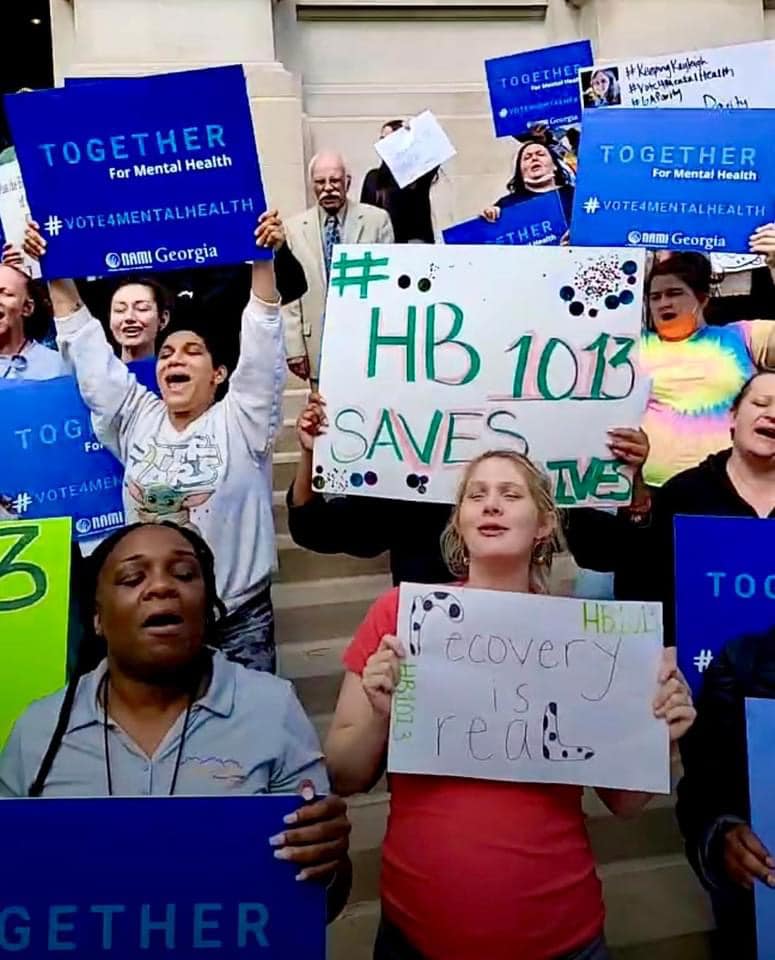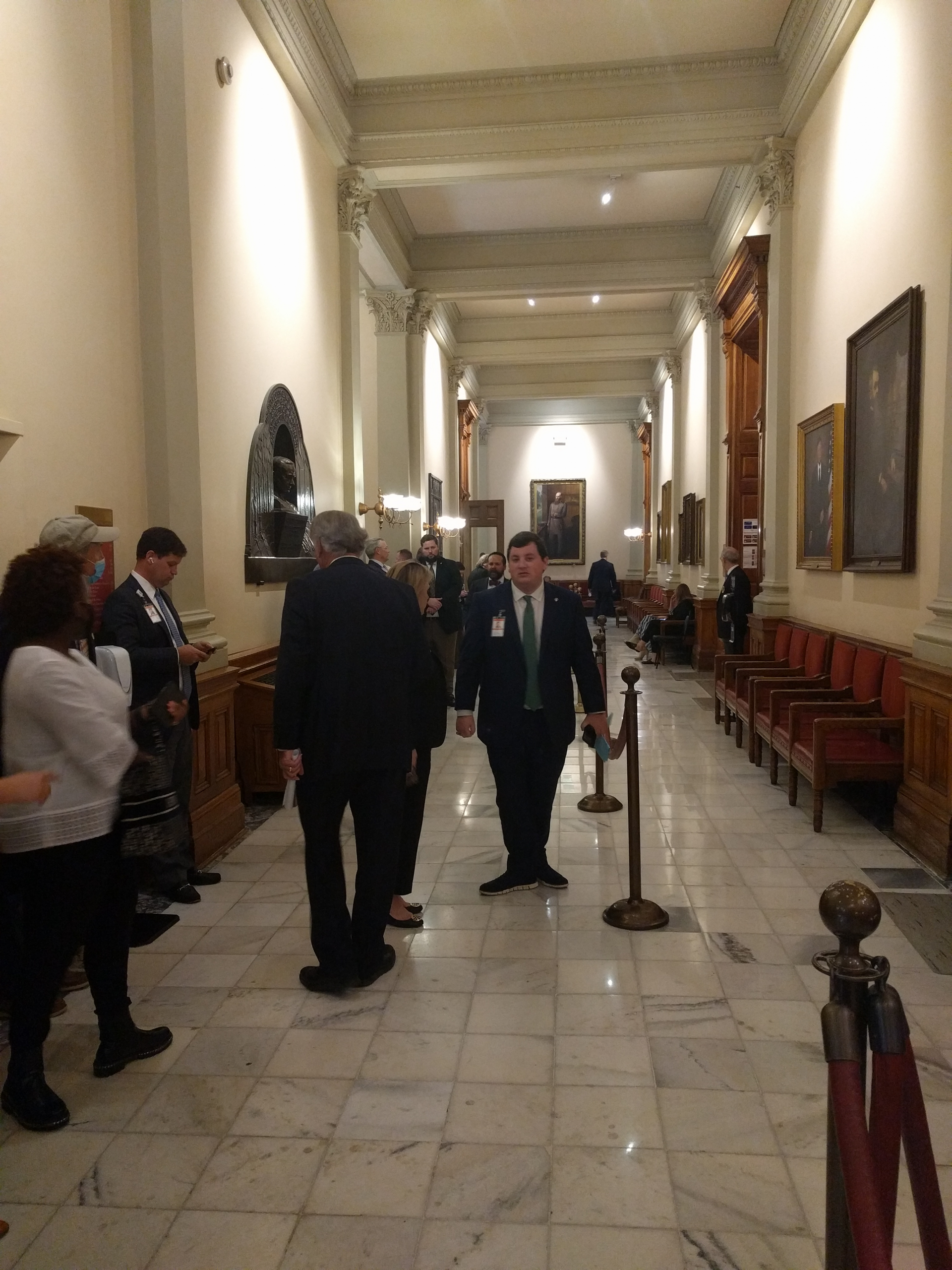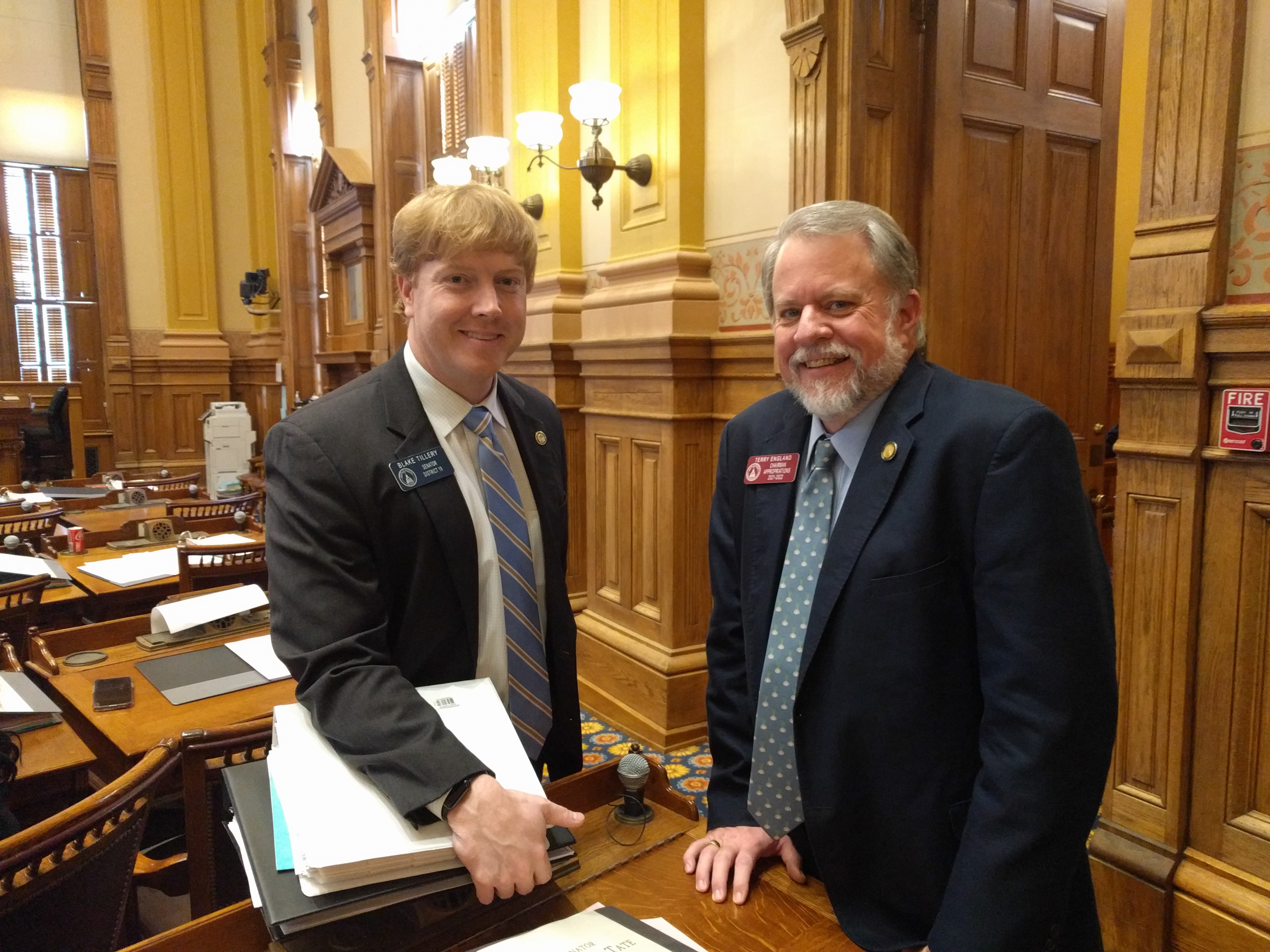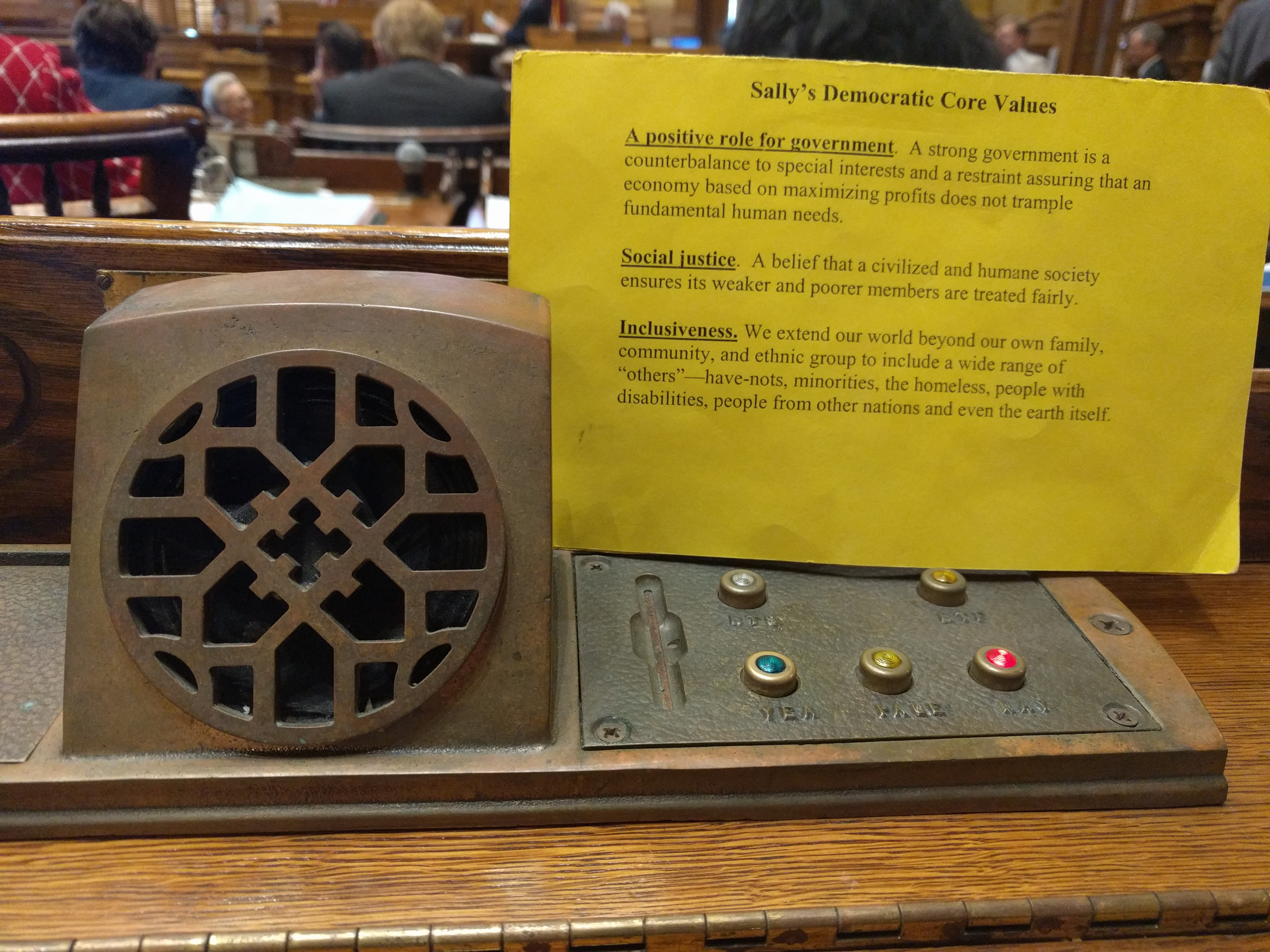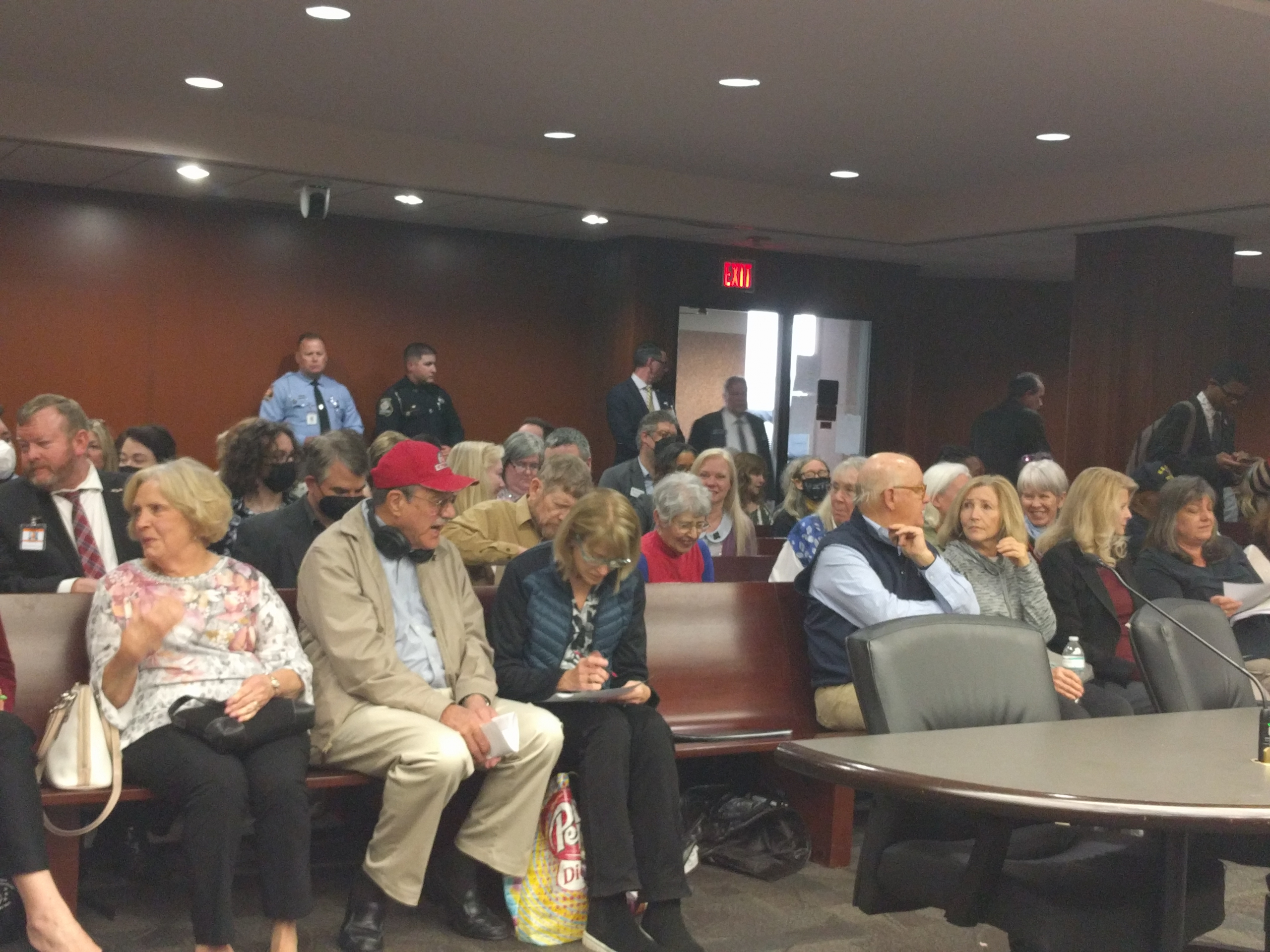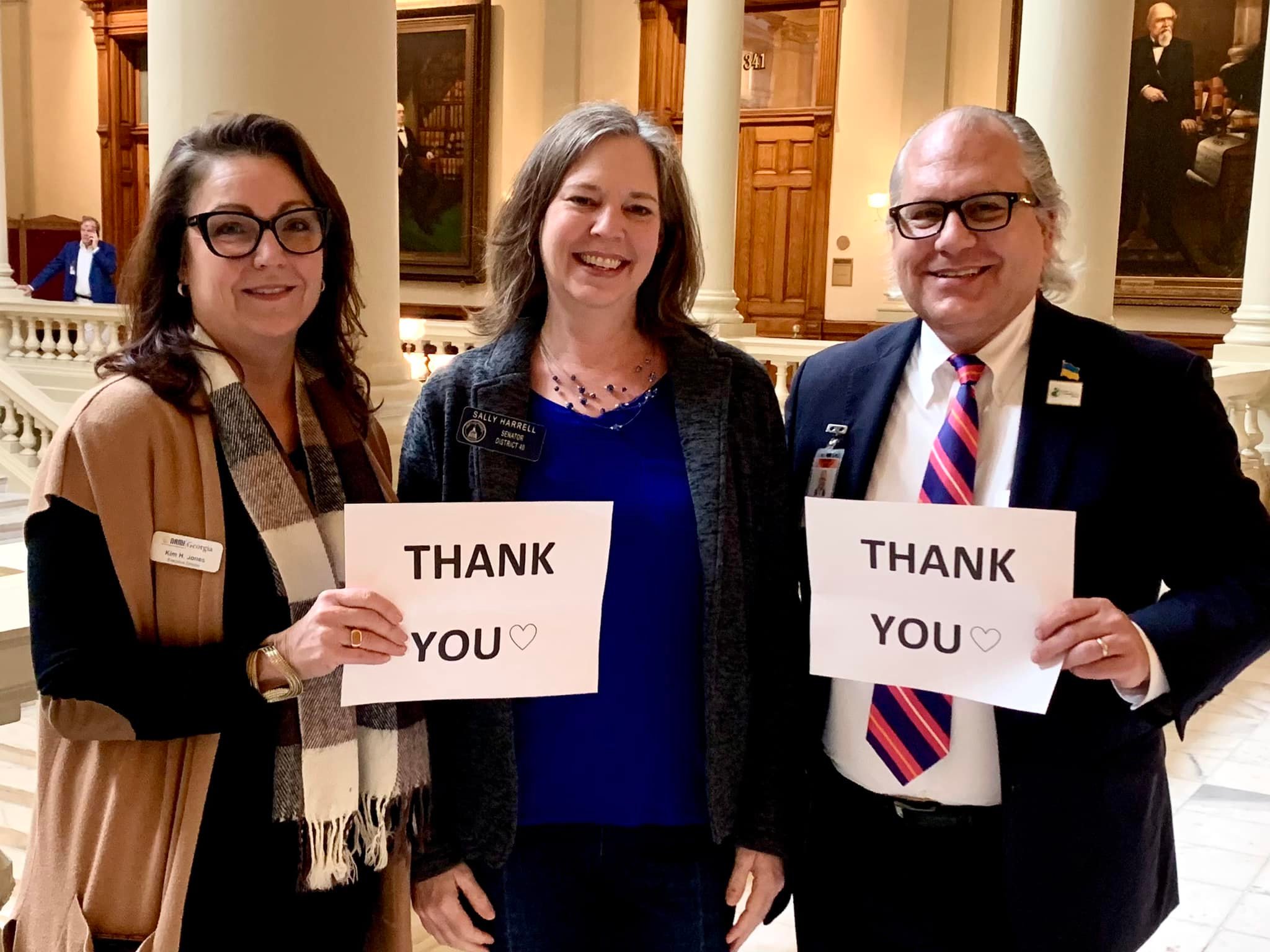Is There a Storm Brewing?
That eerie feeling just before a spring storm, when the air is warm and still.
Sine Die, the last day of the session, always makes me nervous. It’s a very long day and bills that have been dormant since the year before can reappear without notice. This year, big ticket items like the 2023 budget, an income tax overhaul, and yet another elections bill were still hanging in the balance. Like when the weather forecast says “Tornado Watch”, you have to be on high alert on Sine Die.
The Morning Brings Some Welcome Sunshine
The Lt. Governor opened the Sine Die Senate session with his ceremonial “first pitch,” a tradition he initiated in his first year presiding over the Senate.
By morning roll call, the Senate was buzzing — the final budget was on our desks. So much of my work this session focused on the appropriations process. I was relieved to see that everything I worked on — a 40% reduction in University Fees, $230 million for increased higher education funding, and over 500 Community Support Medicaid waivers for disabled people — were still in the budget!
I got a text from the President Holston of Piedmont Technical College. Did the money to begin building a new satellite campus in north DeKalb county make it in? Dang. I couldn’t find it, so I ventured over to Melody DeBussey, Director of the Senate Budget Office, to tell me what happened. We got $4 million, half of what’s needed. It will be up to President Holston to raise the rest from private funds. Know anyone with a few extra million who wants their name on the new building?
My last piece of outstanding business was to get SB 610, my bill addressing the low wages of workers who take care of disabled Georgians, over the finish line. The Senate merely needed to agree to the changes made by the House. Also attached to SB 610 was the original bill of a Republican House member, requiring Georgia to submit a Medicaid Waiver to allow private psychiatric hospitals to treat Medicaid recipients. Not only was I responsible for my own bill, but I was now also carrying a good bill authored by a Republican. It’s usually the other-way-around!
I knew that, like every other step in the process, I had to be proactive about getting SB 610 to a final vote. When I asked the Secretary of the Senate when to make my “Motion to Agree”, he pointed me to the woman-behind-the-curtain, who turned out to be the Lt. Governor’s Chief Counsel, Regina Quick. Regina had set up shop in a small cubby behind the Senate rostrum. It was clear she was in charge of advising Lt. Governor Duncan on the run-of-the-show. She assured me she would put SB 610 at the top of the next Agree/Disagree list, but couldn’t say when it would be called up for a vote.
Just before lunch, the Senate unanimously passed the final budget to a standing ovation. It was a brief ray of sunshine as we could all feel good about the state employee pay raises, one year of Medicaid coverage for new mothers, and all of the other positive measures funded in this year’s budget. After the vote, the Senate Appropriations Chair jokingly suggested that we adjourn Sine Die since we had completed our official duty. I kind of wish we had.
The Afternoon Calm Before the Storm
Between lunch and dinner, things slowed to a snail’s pace as if we had no work to do. We took up a few bills and then took a break. Between votes, we heard a number of farewell speeches by Senators who were retiring or running for higher office.
Mid-afternoon, about 400 people joined Governor Kemp and Speaker Ralston at the North steps for a ceremonial bill signing of HB 1013, the Mental Health Parity Bill. While it felt good to celebrate a bill that will help many people, I was aware that there’s still so much yet to do. Our mental health infrastructure is still chronically underfunded and HB 1013 does little to help those who are uninsured or on Medicaid.
In the early evening, we had a scare when an amendment to HB 1215, a Charter School bill, appeared on our desk. It was the “Fairness in Sports” bill banning transgender kids from participating in school sports. Sen. Kim Jackson and I devised a tag-team strategy. While she publicly challenged the germaine-ness of the amendment (being non-germaine means the amendment does not match the subject matter of the original bill and thus can be ruled out of order), I privately expressed my concern to the author of the amendment that it could inadvertently harm vulnerable children. The author withdrew the amendment, and we thought we killed the bill for good, but on Sine Die, anything can happen.
The Winds Begin to Stir
Not too long after dinner, Governor Kemp came to address the Senate. It’s not traditional for the Governor to speak with the legislature on Sine Die. His speech was familiar, reiterating all of his priorities for the session, including “fairness in girls sports.” My seatmate asked me if I thought there was a specific reason for his visit. But I brushed it off, thinking the speech was simply an election year publicity ploy. I was wrong.
SB 610 was finally called up mid evening for the Motion to Agree, which passed unanimously. I notified the author of HB 1404, the bill’s amendment, and was relieved that my mission was finally accomplished. But we still had more than 30 bills left on the Rules calendar.
The last farewell speech of the night was by Lt. Governor Duncan. He talked about his philosophy of intellectual honesty and putting policy over politics, which I recognized from his book, GOP 2.0. It was inspiring. For most of his term, he lived that ethos as he stood up to President Trump, took committee chairmanships away from those who promoted The Big Lie, and stopped several bad bills from coming to the floor.
After his speech, the Lt. Governor and his staff exited the chamber. People started tearing confetti and staffers began to fill the chamber like they do at the end of Sine Die. We thought we might be done and we were ready to celebrate.
A Late Night Downpour
At 11:40 pm, the Lt. Governor came back in and started calling up a flurry of bills, racing to get bills passed by midnight. Before each vote, bill sponsors rushed to the well and blurted out what the bill was without explaining what changed since the last vote. The first bill on that agenda was a sweeping change to Georgia’s income tax code. The House and Senate had very different ideas about what that would look like. Yet we were forced to vote on a conference committee compromise that we had little time to review and got no explanation of before voting.
Close to midnight, I got wind fom an education lobbyist that the “Fairness in Sports” transgender bill was attached to the “Divisive Concepts” anti-CRT bill in the House. When the Lt. Governor called it up, it still wasn’t on our desks. Democrats pushed their buttons to speak, but only the Minority Leader was recognized. She made a motion to have the bill printed so we could read it, but the Republicans voted the motion down. As the final vote took place, I was recognized for a parliamentary inquiry. I tried to alert my colleagues of what was in the bill by asking, “Isn’t it true that the anti-trans bill is attached to this bill and that we have not had the favor of being able to even view?” But the Lt. Governor cut me off and spoke over my final words.
In my ten years of serving in the House and Senate, I have never been asked to vote on a bill I haven’t seen. This was an orchestrated effort and the very opposite of policy over politics. I was so disappointed in the Lt. Governor — he really let us down and failed to live up to the lofty speech he had just given. Immediately after the vote, the Majority Leader moved to adjourn Sine Die. As celebratory confetti was thrown around us, all I could do was stand there in shock. This is not how democracy is supposed to work. Afterwards I faced a slew of reporters who wanted to know how I felt about the vote and what it would be like to tell my family about how it all went down.
Surveying the Damage
When I finally read the transgender sports bill at 9 am the next morning, I was relieved to discover that it wasn’t the outright sports ban we fought against all session. I don’t think even most Republicans knew this, which might be the reason it was not printed and put on our desks. Instead, it directs the Georgia High School Association to convene an oversight commission to study the issue, collect data, and eventually make recommendations. This is the solution for which I advocated on my public Facebook page weeks ago.
I learned later that it was a Republican compromise devised by Speaker Ralston who quietly held it in his back pocket in case he was pressed to pass something. That’s what happened when the Governor visited the House and reminded members that there was still work to be done to fulfill his “fairness in sports” campaign promise. For the next several days, I stayed busy doing interviews as the media tried to dissect the unprecedented breach of the Senate traditions and democratic norms.
The overall results of Sine Die were mixed. You can read a more complete run-down of what passed and what didn’t here in the AJC.
The Silver Lining
With the session behind us, I’m glad to refocus my energy on my family and the election season. Sometimes the legislative session feels like being on a ship out at sea, disconnected from the real world. We often think the world is watching us — and some are — but most are just busy living their lives.
I ran for office so I could try to make life a little easier for people. In some pretty big ways I have, but there’s so much more to do. I plan to return to the Senate to continue to fight for you, and for those that have no voice. Yes, now that the session is finished, it’s campaign season already – see that “Donate” button below? But to make a real difference on healthcare, public safety and education, we have to change the players in charge. A Democratic Governor and Lt. Governor will be a huge moderating effect on a GOP-controlled legislature that has underfunded our state government for so long, and continues to push ideologies that are quickly becoming more and more extreme. So get ready to work hard this fall to get out the vote for our candidates up and down the ballot!
It all starts with you — a democratic government works best when citizens get involved. Support strong, bold candidates and decide what you can do in the upcoming election. Together, we can make a difference.
Sine Die!

